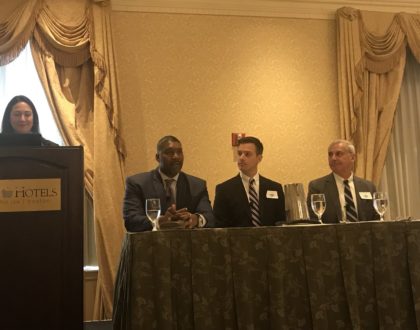A Call To Men In Leadership Positions: Help Support Pay Equity!

With a history of over 150 years of social justice and civic engagement work done at the intersections of race and gender, YW Boston has gained unique insights into how diversity and inclusion practices help build racial, gender and economic equality in our city. For generations, YW Boston has made strides to bridge the gender and race divisions that threaten to keep us from becoming the best version of ourselves in community.
Although we still have a long way to go and a lot to learn about the issues often hidden beneath complex intersections, we have managed over the years to make meaningful progress in the work of engaging strong allies to support better diversity and inclusion practices across the board.
The city of Boston is on the verge of a cultural shift. Community officials are calling upon civic, industry and non-profit leaders to help address the pay gap that still exists between men and women in the workforce.
On April 12, 2018, Megan Costello, Executive Director for the Mayor’s Office of Women’s Advancement, hosted a panel discussion called “Engaging Male Leaders: Organizational Benefits of Diversity, Inclusion and Gender Equality.” The conversation drew in a large group of leaders, representing an impressive number of sectors across the city of Boston.
Boston Mayor, Marty Walsh, invited men in leadership positions to help raise awareness and become more intentional in the work of supporting pay equity initiatives. “This work doesn’t happen by accident,” he said. “We can’t say that we’re color blind or gender blind. We must see the differences in each other to understand the value of different perspectives.”
In his address, Mayor Walsh went on to acknowledge his own white privilege and his responsibility to use his leadership position to help carve pathways for people who are still being left out of economic advancement and opportunities for upward mobility. “I’m a white, Irish guy from Dorchester and I can’t change that,” he said. “But we can change what that means. We can change our attitudes by having dialogues and conversations, and sometimes, really tough conversations. That’s what I can do. I can be a champion and an ally for all of the women that work and live in the city of Boston.”
The three male leaders invited to speak on the panel, shared advice on best practices for diversity and inclusion efforts. “The health of our companies depends on making sure 100% of our people are 100% engaged, 100% of the time. We can only do that when everyone’s contributions are valued,” said Paul Francisco, Chief Diversity Officer of State Street. “Our focus at State Street is on inclusion. We need to include all voices in the room. Visible male ally-ship is critically important,” he added. “We’re not trying to solve the ‘women problem,’ what we’re trying to do is make healthier organizations. We need to make sure that women feel that State Street is where they want to continue their careers.”
David Margolius from Shawmut Builds, shared reflections of the inclusion efforts made in his company to help bring more women on board. “The construction industry is 9% female,” he said. “In terms of best practices, building a pipeline was super important. People who went through that program have stayed for a long time.”
“What we need to focus on are systemic solutions,” said Victoria Budson, Director of the Center for Women In Public Policy at Harvard University. She went on to provide useful scientific research, illustrating trends in the current landscape of issues in pay equity. Additionally, she shared some concrete tools to help streamline the work that people are doing across organizations.
YW Bostons supports this and other initiatives like these, that actively strive to help bring into conversation, more male leaders as allies and advocates for women in the workforce. Working in silos only gets us so far. “This can’t just be women, talking to women,” said Megan Costello. “You cannot solve 100% of the problem with only 50% of the population. Our male allies are critical to that equation. Today is about recognizing the role that ALL of us have to play, the responsibility that each of us has in ensuring that women’s voices are heard and included. This is the right thing to do, but we also know that this is good for the bottom-line of businesses, and good for our economy as a whole.”
We would like to extend an open invitation to male leaders in our community who want to help us keep moving the needle forward. Join us in working to ensure that women gain equal access to resources and opportunities for continued advancement. Your support is critical to our mission of eliminating racism, empowering women and promoting peace, justice, freedom and dignity for all.
If you’d like to learn more about this city-wide call to action, watch the full panel below and consider partnering with us in the work of deepening diversity and inclusion practices at your organization.

